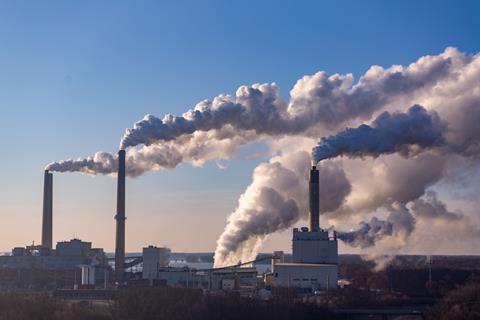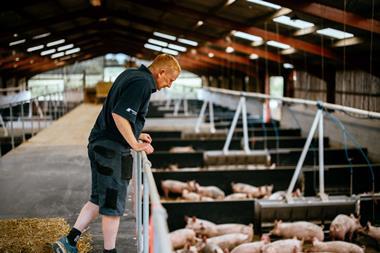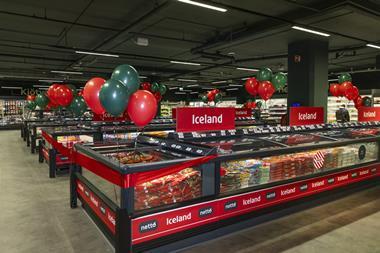
Britain’s leading food and drink manufacturers are being urged to bolster their climate targets, after being found responsible for “staggering” carbon emissions in a new report.
The report by youth campaign group Bite Back reveals the UK’s top 10 food and drink manufacturers – Ferrero International, Mondelez International, Unilever, Kellogg Company, Mars, Nestlé, PepsiCo, The Coca-Cola Company, Kraft Heinz and Danone – emitted 477 million tonnes of carbon dioxide equivalent (CO2e) globally in 2022.
This was more than both the whole of the UK’s emissions and the international aviation industry’s emissions in 2022, each of which amounted to 426 million tonnes of CO2e [GHG emissions of all world countries, Publications Office of the European Union, Luxembourg, 2023].
While all 10 businesses had set short-term targets to reduce their carbon emissions by 2030, many of these targets were “not ambitious enough to limit global warming to +1.5°C and achieve net zero by 2050”, according to the report.
Three manufacturers – Ferrero, Kraft Heinz and PepsiCo – were found to have increased their annual carbon emissions in 2022, after having set targets to reduce them.
On the back of its findings, Bite Back has called on all 10 manufacturers to “set near- and long-term targets aligned with the 1.5°C climate limit, validated by the Science Based Targets initiative (SBTi) and covering all greenhouse gas emissions, including Scope 3”.
“They must commit to cutting total emissions by 50% by 2030 and reaching net zero by 2050, alongside publishing transparent reports on their progress,” it added.
Bite Back has also recommended that governments must mandate businesses to report “publicly and consistently on the sales of unhealthy food and drinks and their sustainability metrics on an annual basis”.
‘Food companies should do more’
“It’s clear that the biggest and most successful global food companies need to do much more,” said Bite Back CEO James Toop.
“From our assessment, we don’t have confidence that these businesses are on track to meeting net zero targets by 2050 and protecting the planet’s health.”
A spokesman for Ferrero said the manufacturer was “committed to reducing its emissions for each tonne of product produced (Scope 1, 2, and 3) by 43%, and halving emissions from its owned operations (Scope 1 & 2) by 2030”.
“These targets have been verified by the Science-Based Targets initiative (SBTi) to be in line with the Paris Agreement since October 2020. We transparently report our 2030 emissions targets in adherence with the requirements outlined by the SBTi, and we share our progress in our annual Sustainability Report, which is published on our website.
“In recent years, Ferrero has experienced growth and production output has seen an increase of above 16% since 2018. Despite the growth, we have achieved an absolute reduction in Scope 1 and 2 GHG emissions by 10%, comparing 2022/23 to the 2017/18 baseline.”
A spokeswoman for Kellanova (formerly Kellogg Co) said: “We are committed to playing our role in tackling the climate crisis and reducing emissions.
“An important part of this is ensuring that our company-wide emission reductions are in line with science-based net-zero standards and validated by the Science Based Targets initiative (SBTi).
“We are working hard to meet these targets and continuing to join forces with our partners, industry peers and government to drive the collective action needed for systemic change.
“One example of this is our involvement in a government-supported fuel switching trial at our Manchester-based factory. As part of this, we’ll be using hydrogen in the industrial cooking ovens instead of fossil gas, helping to both reduce our own carbon footprint and showcase the viability of hydrogen as an alternative fuel, therefore laying the groundwork for decarbonising food production at scale.”
Kraft Heinz advised that its most up to date emissions data and reporting methodology for 2022 was outlined in its 2023 ESG report. This report offered ”a more complete picture” than the data used in Bite Back’s report because Kraft Heinz “had since improved our ability to measure scope 3 emissions between 2022 and 2021”, according to a spokeswoman.
A spokeswoman for Mars said: “The 2022 data in this report is not reflective of our latest progress.
“In line with the requirements outlined by the SBTi, we report transparently on latest emissions targets and have shared our 2023 progress in our ’Sustainable in a generation’ plan, which is published on our website.
“We remain on track to delivering a 50% reduction by the end of 2030. In 2023, Mars achieved a record 8% absolute GHG reduction, bringing total reductions to over 16% against our 2015 baseline.
“To accelerate progress, in 2023, Mars pledged over $1 billion over three years towards our goal to halve GHG by 2030 across our full value chain and achieve net zero by 2050.”
Nestlé aimed to achieve net zero “by 2050 at the latest”, a spokeswoman told The Grocer.
“We’re proud to be a company progressing in the right direction, as the report shows.
“By 2023, we achieved a 12.75% reduction in emissions. We are more than halfway to our 2025 Net Zero Roadmap target of 20% absolute emissions reductions against a 2018 baseline.”
A spokeswoman for PepsiCo said: “As one of the world’s leading global food and beverage companies, we want to help food systems manage and adapt to the effects of climate change.
“As part of this, we aim to invest and innovate strategically to reduce our carbon footprint.
“Our recently published climate data for 2023 demonstrates positive progress, with Scope 1 and 2 emissions reduced by 13% (a 33% reduction versus a 2015 baseline) and our total Scope 1, 2 and 3 emissions reduced by 5% (a 4% reduction versus a 2015 baseline).
“We know that our efforts do not occur in a vacuum – advancing climate progress requires systemic changes, collective actions and industry-wide investment; and we continue to engage with our value chain, industry and governments to help drive that transition.”
The Grocer has approached Mondelez, Unilever, Mars, Coca-Cola and Danone for comment.



















No comments yet